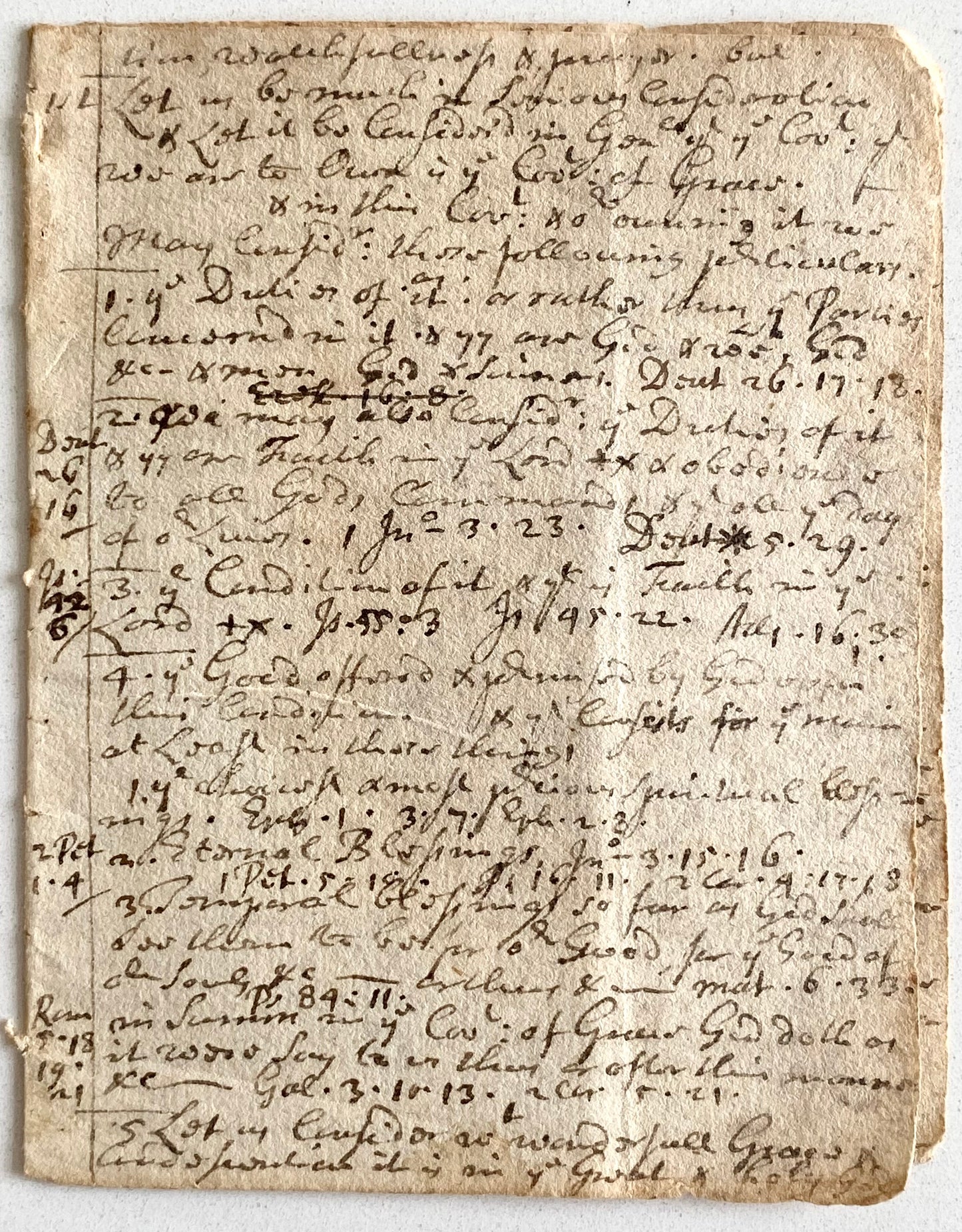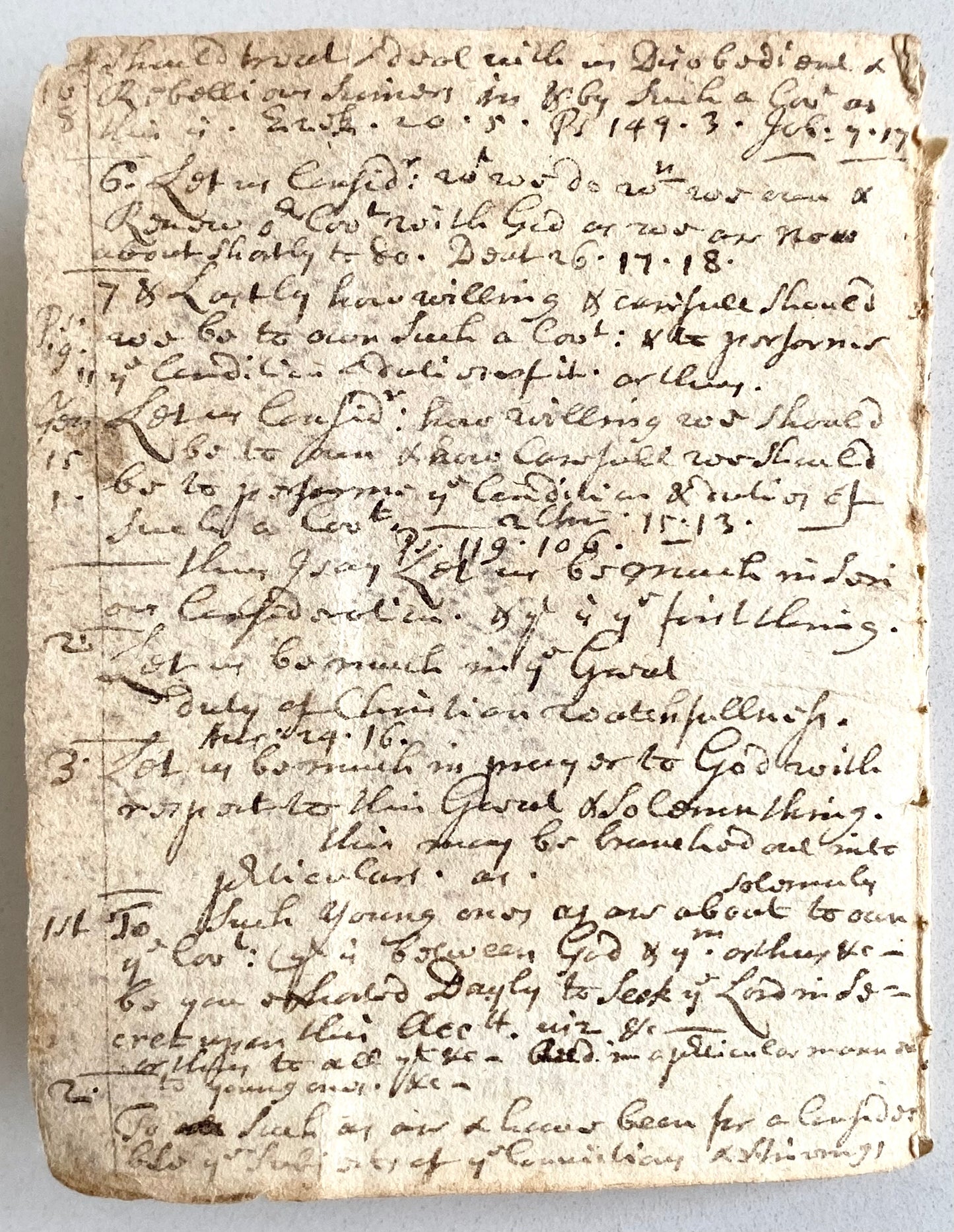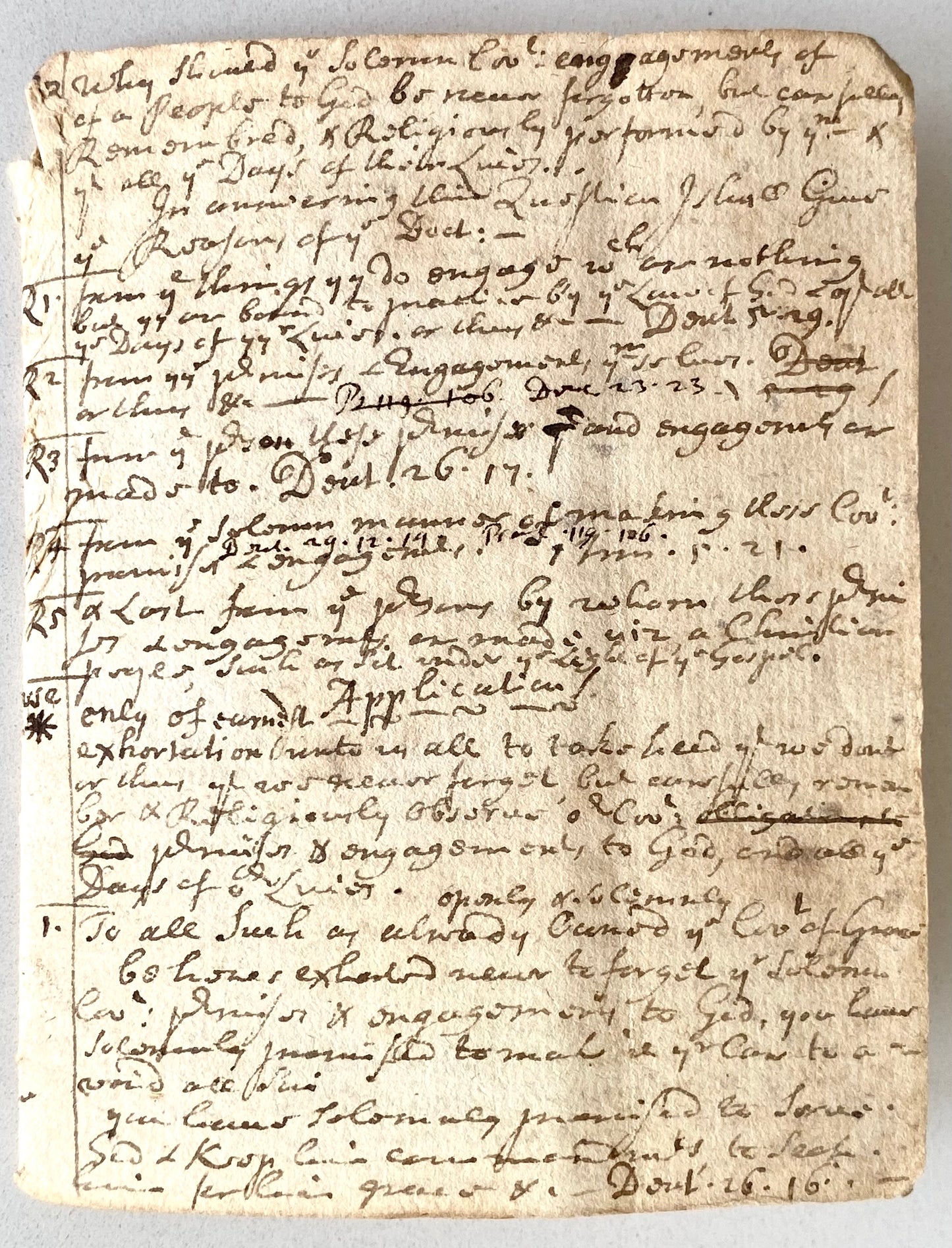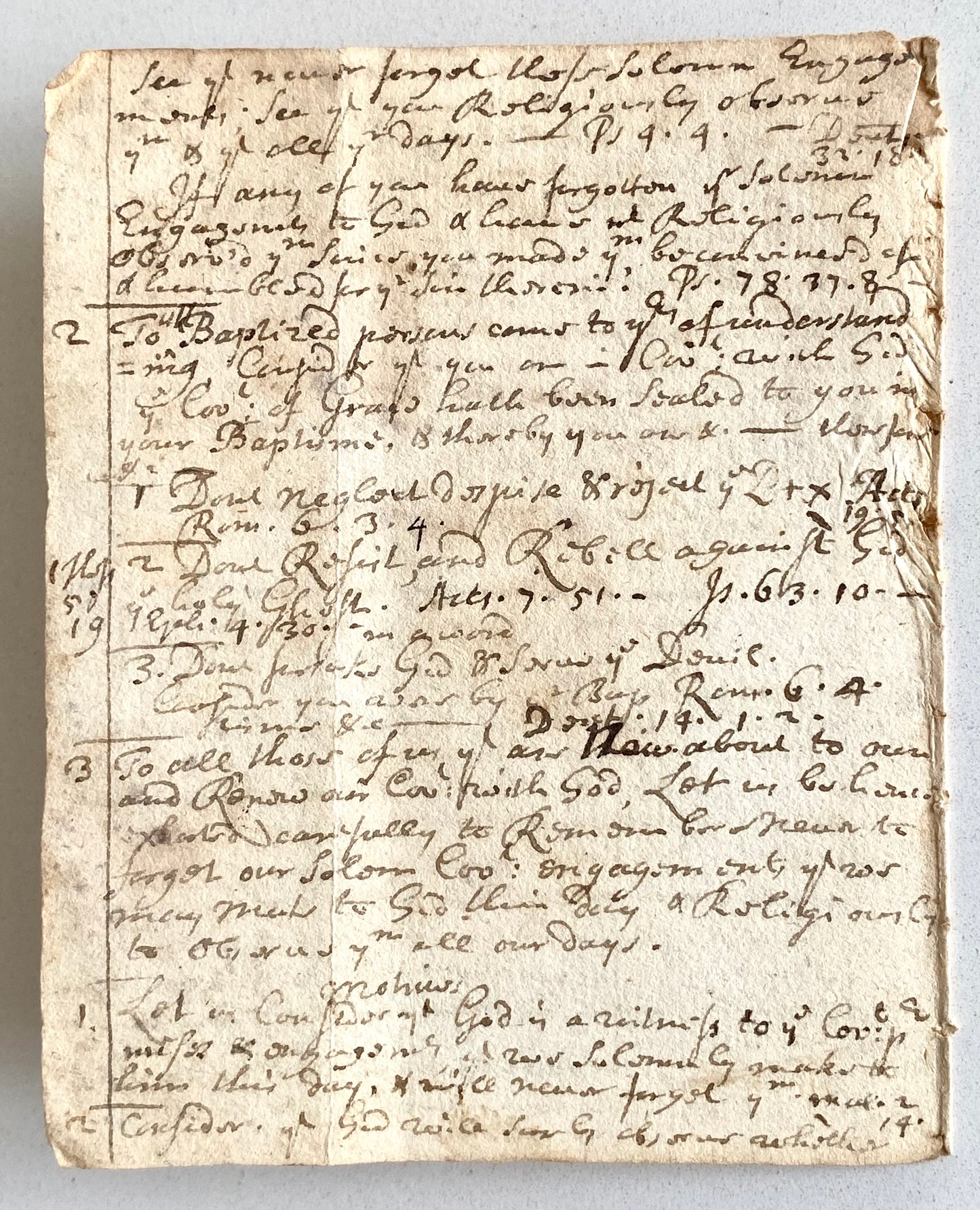Specs Fine Books
1720 JONATHAN EDWARDS / TIMOTHY EDWARDS. Sermon MSs on Baptism, Renewal of the Covenant, and the Lord's Supper.
1720 JONATHAN EDWARDS / TIMOTHY EDWARDS. Sermon MSs on Baptism, Renewal of the Covenant, and the Lord's Supper.
Couldn't load pickup availability
A wonderful piece of unpublished Church history with superb provenance.
The present is a 4pp, c.1,000-word sermon manuscript entirely in the hand of the father of Jonathan Edwards, Timothy Edwards, and involves one of the most important theological conversations of the Puritan and Colonial era of American Theology, the relationship of Baptism to Covenant.
The relationship between these two Christian sacraments lay at the heart of the Half-Way Covenant controversy, which involved the entire Edwards clerical ancestry; i.e. Solomon Stoddard, Jonathan Edwards' grandfather; Timothy Edwards, Jonathan Edwards father and the author of the present manuscript; and Jonathan Edwards himself. Unlike Jonathan, who was said to have put the nail in the coffin of the Half-Way Covenant, Solomon Stoddard and Timothy Edwards were deeply embroiled in advocacy for the controversial position.
Solomon Stoddard [1643-1729] succeeded Eleazer Mather as the minister at Northampton and was, consistent with his son-in-law Timothy and his grandson Jonathan later, a vigorous, earnest, and threatening preacher. His publications are deeply reminiscent of the more popular works of his grandson, including treatises on sound conversion, on the safety of being in Christ at the judgment, on the fear of Hell, etc.
So great was his influence in the Connecticut River Valley that he was called, by both friend and foe, "Pope Stoddard." He used this influence to begin a preaching school, with his son-in-law Timothy as the only other faculty. Its name alone tells us something of the primary nature of preaching as the means of grace in the eyes of Stoddard, The Connecticut River Valley School of Preaching.
A prominent pulpit, widely distributed author, published works in the tradition of puritan conversion, and the head of a school for training ministers . . . this made it all the more troubling when he began introducing his practice of a more relaxed communion. It sent shockwaves throughout New England and became one the defining controversies of the 18th century.
One interpretation of the history says that his view of conversion began to change, seeing room for those who had been in the covenant as baptized Children, and who grew into their faith more naturally, without the standard puritan "crisis." A more critical view posits that he saw his congregation dwindling, less and less congregants seeking "conversion," and he took the pragmatic step of simply broadening the definition of what it meant to be a Christian.
In practical terms, it meant that baptized congregants who were living lives that were upright in the community, who believed the Gospel to be true, but who had not had the "crisis" conversion experience, were invited to participate in the Lord's Supper and to have their children baptized. This also made them "voting" members of the congregation, under the Congregational system.
Some in New England rejoiced and saw this as a recognition of what had always been true . . . not everyone had this "crisis" experience. Others, greater in number it seems, or at least in volume, saw it as the beginning of the end of genuine piety and godliness in New England. The controversy reached its fever pitch with public debates between Stoddard and Cotton and Increase Mather, two of the most prominent men and ministers in New England.
In 1725, young Jonathan Edwards became his grandfather's Associate Pastor. It is evident that, whatever his views at the time, his later pastoral ministry was more consistnet with those of Increase and Cotton Mather than his own grandfather.
Less is known about the specific views of Timothy Edwards [1669-1758]. He graduated Harvard, pastored at Windsor, Connecticut, and became son-in-law to Stoddard when he married Solomon's daughter, Esther. He was well-regarded and his church experienced multiple seasons of revival before the Great Awakening. For all that, he seems to have been a bit lost between the reputations of his father-in-law and his luminous son. It is probably reasonable to assume that he was in some degree of agreement with his father-in-law, or he would likely not have been teaching at the College they ran together.
The present document by Timothy Edwards, specifically on baptism and the covenant, may shed light on this important controversy and certainly on Timothy's own views on the subject.
To find an unpublished document by Timothy Edwards directly related to this important theological conversation of the era is really a delight. And that controversy has relevance for today. The Half-Way Covenant was interesting in that it was both traditional, in the sense that it viewed America as a Covenanted Nation [which drew from their Presbyterian roots; and innovative, in that it then viewed all Americans as in the Covenant [in some soft way] and in need of Conversion to that Covenant, with the Lord's Supper being a means of grace in that process. The idea actually has strong connectivity to some of the "belong before you believe" missiology of our time.
From the important collection of Rev. Robert Crawford [1804-1896]. He was a student of and son-in-law to the President of Williams, and prominent Second Great Awakening preacher, Edward Dorr Griffin. Crawford also had a lengthy friendship with perhaps the theological and Americana autograph collector of the day, William Buell Sprague. From his album, by descent through the family, entirely fresh to the market.
Worthy of further research and publication.
Timothy Edwards [1669-1758] graduated Yale in 1691 and was licensed to preach in 1694. He pasted the church in East Windsor for 68 years consecutively, not missing a sabbath save a short season where he served as Chaplain to a group of soldiers on expedition to Canada in 1711. His wife was the daughter of prominent New England divine, Solomon Stoddard.
Four pages, not the complete manuscript, but substantive and we suspect lacking only a small section. Measuring 3 x 4 inches and containing c.1,000 words.
Extracts include [with possible faults]:
"Let us be much in serious Consideration & Let it be Considered in General that the Covenant that you are to own is the Covenant of Grace & in this Covenant & our owning it we may Consider these following particulars:
1. The Duties of it: Or rather then the Parties Concerned in it . . . those of God and man; God & sinner. [Deut 26.17, 18].
2. We may also Consider the Duties of it & of your own Faith in the Lord & Christ & obedience to all God's Commands & that all the days of our lives. I John 3.23. Deut 5.29.
3. The Condition of it & that is Faith in the Lord and Christ. Isaiah 45.3, Isaiah 45.22, Acts 16.30.
4. The Good offered & promised by God upon this condition, & it consists for the main at least in these things:
i. Ye lavished & most precious spiritual blessings. Eph 1.3-7; 2-3.
ii. Eternal blessings. John 3.15, 16. I Peter 5.10.
iii. Temporal blessings, so far as God shall see them to be for our Good, for the Good of our souls, &c - others &c. - Matthew 6.33.
In summary, in the Covenant of Grace God doth offer it . . .
5. Let us Consider what wonderful Grace & Condescension it is in the Great & holy God should treat & dwell with us Disobedient & Rebellious Sinners in & by such a Covenant as this, Ezek 20.5; Psalm 149.3; Job 7.17.
6. Let us Consider wt we do wn we come & Renew our Covenant with God as we are now about shortly to do. Deut 26.17, 18.
7. & Lastly, how willing & careful should we be to own such a Covenant: & to perform the Conditions & duties of it.
1. Let us Consider how willing we should be to own & how Careful we should be to perform ye Conditions & duties of such a Covenant.
2. Thus I say, Let us be much in our Consideration. & That is the first thing. Let us be much in the Great duty of Christian Watchfulnesss. Acts 24.16.
3. Let us be much in prayer to God with respect to this Great & Solemn thing. This may be branched out into particulars, as
. . .
Why should the Covenant engagements of a People to God be never forgotten, but carefully Remembered, & Religiously performed by them, & that all the days of their live.
In answering this Question . . .
1. from the things they do engage which are nothing but they are bound to practice them by the Cause of God, & that all the days of their lives.
2. From the promises of the Engagement [in the Covenant] themselves.
3. From the personal blessings & goodness of the Engagement [in the Covenant]
4. From the solemn manner of making this Covenant
5. And last, from the persons by whom those are made, viz a Christian, etc.
Application.
Exhortation unto all to take heed that so we don't or thus yet so I never forget, but carefully remember & religiously observe of the Covenant promises & engagement, to God, and that all the Days of our Lives.
1. To all such as already openly & also ****** owned the Covenant of grace, be however exhorted never to forget your Solemn Covenant promises & engagements to God. You have solemnly promised to make it your care to avoid all sins. You have solemnly promised to Serve God & keep his commandments, etc.
See never forget those solemn engagements, see that you Religiously observe them & that all your days.
If any of you have forgotten your solemn Engagements to God & have not religiously observed them since you made them, be convinced & hear . . . be **** for your sin . . .
2. To the Baptized persons come to years of Understanding, . . . and to whom God's Covenant of Grace hath been Sealed to you in your Baptism, & thereby you are, &c.
1. Don't neglect or despise & reject your Baptism & Christ.
2. Don't Resist and Rebell against God & the Holy Ghost
3. Don't forsake God & Serve the Devil
To all those of us that are now about to own and renew our Covenant with God, Let us be honest with our hearts & carefully to remember & never to forget our Solemn Covenant, etc."
A truly historic manuscript, completely unresearched and unpublished in the academic community. Worthy of institutional preservation or fine private collection.
Share








